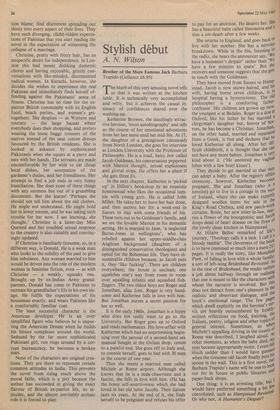Stylish debut
A. N. Wilson
The blurb of this very amusing novel tells us that it was written at the kitchen table. It is technically very accomplished and witty, but it achieves the casual in- timacy of confidences shared over the washing-up.
Katherine Browne, the dazzlingly attrac- tive heroine, 'loves autobiography' and tells us the course of her emotional adventures from her late teens until her mid-30s. At 17, the daughter of a greengrocer (deceased) from North London, she goes for interview at London University with the Professor of Philosophy. He is a loud, hairy Jew called Jacob Goldman, his conversation peppered with Marxist thought, sexual explicitness and glottal stops. He offers her a place if she gets three Es.
In the next chapter, Katherine is 'picked up' in Dillon's bookshop by an exquisite homosexual who likes the occasional tum- ble with young girls. He is called John Millet: He takes her to have her hair done, and then escorts her for a week-end in Sussex to stay with some friends of his. These turn out to be Goldman's family, and we see the lovable Marxist in his domestic setting. He is married to Jane, 'a neglected Burne-Jones in wellingtons', who has rebelled against her upper-middle-class Anglican background (daughter of a distinguished conservative theologian) and opted for the Bohemian life. They have in- numerable children because, as Jacob puts it, they 'like fucking'. There are children everywhere; the house is unclean; one squelches one's way from room to room over squalling infants and squashed fish- fingers. The two eldest boys are Roger and Jonathan, alias Jont. Roger is very hand- some and Katherine falls in love with him. But Jonathan nurses a secret passion for her as well.
It is the early 1960s. Jonathan is a hippy who does not really want to go to the University. But Roger goes up to Oxford and reads mathematics. His love-affair with Katherine which had an unpromising begin- ning over the perusal of a second-hand sex manual bought at the Oxfam shop, comes to a painful end. She goes off to Italy and, to console herself, goes to bed with 30 men in the course of one year.
Then she meets a married man called Michele at Rome airport. Although she knows that he is a male-chauvinist and a fascist, she falls in love with him. (He has the bossy self-assertiveness which she had loved in her old tutor Jacob). Their liaison lasts six years. At the end of it, she finds herself to be pregnant and refuses his offer has a beautiful baby called Simonetta and it dies a cot-death after a few weeks.
She returns to England, and goes back to live with her mother. She has a nervous breakdown. While in the bin, listening to the radio, she hears the announcer say, 'We have a humanist's despair' rather than 'We have a few minutes to spare'. But she recovers and someone suggests that she gets in touch with the Goldmans.
They have moved from Sussex to Hang" stead. Jacob is now snowy-haired, and his wife, having borne seven children, is in hospital having a hysterectomy. The old philosopher is a comforting father' confessor. His children are grown up now; the youngest is at Bedales. Roger is a don at Oxford; like his father he has married a clergyman's daughter but, horror 'of hor- rors, he has become a Christian. Jonathan, on the other hand, married and separated from a Greek, is free and declares that he loved Katherine all along. After her dir.' ficult childbirth, it is thought that she can not have any more babies. Jonathan is verY, kind about it. (`He anointed my vaginal lobes with a few brief kisses'). They decide to get married so that they can adopt a baby. After the registry office ceremony, however, Katherine becomes pregnant. She and Jonathan (who is a novelist) go to live in a cottage in the west of Ireland, where she can make expertly designed woollen items for sale in the King's Road Chelsea, and sew patch-work curtains. Rosie, her new sister-in-law, mar,: ries a flower of the bourgeoisie; and Jaccw, drops dead of heart disease on the floor 01 the lovely clean kitchen in Hampstead. As Hilaire Belloc remarked of life 'S journey, 'Theology calls it a task. I call it a bloody ramble'. The cleverness of the book is to have crammed so much into a mere 211, pages. It is really the story, like Mansfield Park, of falling in love with a whole family' a sort of left-wing Brideshead Revisited. As in the case of Brideshead, the reader suffers a jolt about halfway through on realishig, that one is meant to like the characters NvIt'' whom the narrator is involved. But this does not detract from one's pleasure in the realistic and observant dialogue, and the book's emotional range. The few pages which dwell explicitly on the heroine's cer- vix are heavily outnumbered by freshly- written reflections on food, knitting, the Italians, poetry, religion and other topics of general interest. Sometimes, as when Michele's appalling driving in the streets 0. Rome was described, I laughed aloud. Al other moments, as when the baby died, rl eyes became appropriately moist. I even fel much sadder than I would have guessed when the tiresome old Jacob finally puts his, spoon in the wall. This is a first novel, bu Barbara Trapido's name will be one to 10°`,', out for in future in public libraries an
paper-back shops. but I One thing: it is an arresting title, bu
would have preferred something a hit 165 convoluted, such as Hampstead Revisito_1.
Or why not, A Humanist's Despair?






































 Previous page
Previous page